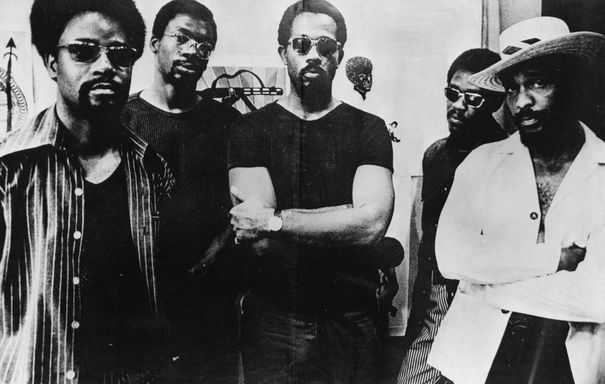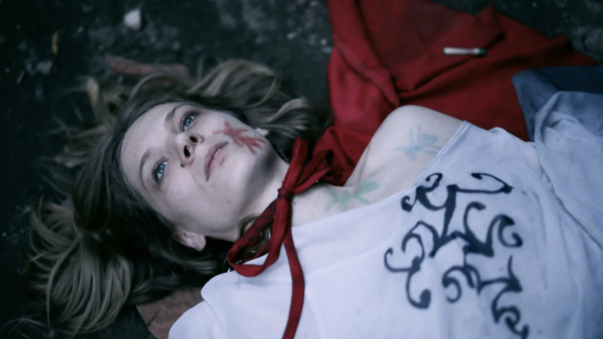Letters from Berlin: A Revolutionary is a Doomed Man
Corresponding from the 70th Berlinale, Adina Glickstein and Rodrigo Garay reflect on Eldridge Cleaver, Black Panther and Orphea By Adina Glickstein & Rodrigo Garay

© Still from Ruben/Benston Film Collection Walker Art Center
Letters from Berlin: A Revolutionary is a Doomed Man
Rodrigo—
Our morning viewing of William Klein’s ELDRIDGE CLEAVER, BLACK PANTHER (USA, 1970, screened as part of the 50th Anniversary Forum) left me restless, agitated by the persistence of precisely the problems the Black Panthers fought half a century ago. Found footage scattered throughout Klein’s film highlights police brutality, the riots at the 1968 DNC, the violence of the U.S. Empire as it intervened in Vietnam. The primary change, it seemed to me, was the conviction, clarity and resolve with which Cleaver addressed these lingering problems head-on, matter-of-factly diagnosing them with a brazen poise that few today would dare to espouse. His injunction to “kill the pigs,” is offered over verité footage of his exile in Algeria with absolute confidence, a clearheaded assessment of the injustices that inhere fifty years on.
“A REVOLUTIONARY IS A DOOMED MAN,” reads a First International pamphlet drawing on Nechayev which we learn, in Klein’s film, that the Black Panthers reissued. Doomed revolution offers a through-line between the two films we watched together, CLEAVER and Alexander Kluge and Khavn’s ORPHEA (2020), which otherwise could not be more disparate. CLEAVER had me convinced of the utility—indeed, the necessity—of revolutionary violence, grinning each time a close-up zoned in on Cleaver’s hand clutching the glinting knife he purchased “for friends back in Babylon.”
ORPHEA, screened in the festival’s Encounters sidebar, doesn’t endorse violence so much as enacting it. Dense accretions of found footage keyed in under deranged performances, equipment peeking through behind the green screen’s background; jumbled multicolored inter-titles spliced between flashing music video interludes and fragments of Khavn’s poetry, spelled out in a typeface dripping like bodily discharge. The only descriptor I can land on is “semioblitz,” an appropriately violent moniker (borrowed from Mark Fisher but popularized by the CCRU) for the sensory onslaught of all these stimuli. Where Klein’s film offered a slick portrait, advertorial or agitprop but inarguably prescient, Kluge and Khavn’s message—if one is to be found—is broadcast in a lunatic fervor.
Here is what I managed to pull out of ORPHEA: green-screen riffs and archival imagery from the Soviet Union advocating Cosmism—the Communist philosophy of immortality for all—illustrate the titular character’s mission to revive her lost lover from the underworld. Death, Kluge posits, is the ultimate sexual frustration; therein lies its fundamental reprehensibility. He draws in footage from contemporary loss of life to modernize the myth, videos arrayed three or four at a time on a black background. Things start to slant reactionary with the insertion of an infamous photograph, immediately recognizable as my blood pressure spikes: a drowned migrant child washed up to shore. Tragedy instrumentalized for incitement. Certainly, this moment is activating—but in service of what? The claim remains unclear to me.
Two films, two disparate paths to provocation. Klein’s portrait of Cleaver is a tight manifesto, outlining the Panthers’ ten-point program verbatim and imaging Cleaver, seductive, at the center of it all. Though he openly derides the establishment’s fixation on singular charismatic leaders, Cleaver is explicitly framed as one—winkingly, maybe, with a sideways glance towards the scene-satire that launched Klein’s career. Perhaps Kluge shares in this canny recognition, working in an intensified parody of the media landscape that surrounds him. But it stagnates in its absence of forward motion, uncritically partisan to the political disorientation that, today, only serves to shore up the injustices it professes to observe.
Signing off, in solidarity.
Adina

Dear Adina—
I’m glad we can both agree on the irony of William Klein’s portrayal of Eldridge Cleaver as a seductive and assertive leader. The tactile quality of the verité sections wonderfully clashes with the self-evident commentary and abrupt typefacing of Brechtian propaganda, both theoretically and materially: Cleaver’s magnetic personality is undeniable, and when you devote so much uninterrupted screen time and space in the frame to his smooth talking (let’s be honest, the introductory shot where Cleaver’s explaining his situation in Algeria is quite a close-up!) it becomes unquestionable as well—at least to the most receptive and credulous audiences.
I’m wary of political figures by nature and I believe this film sends ironic warning signs of the Messianic quality of the Black Panthers spokesman all the time (remember when Cleaver is holding hands with the Vietnamese, all dressed in white?) In that regard, I can’t help but recommend Travis Wilkerson’s AN INJURY TO ONE (2002) because of how it echoes (and questions) the work of Santiago Álvarez, the legendary Cuban propagandist. In our times of in-bound marketing and surreptitious ideology mass-feeding, perhaps the bluntness of agitprop could help produce an unexpected understanding of the audiovisual language that surrounds us.
Your candid take on the necessity of political action also reminds me of what you said the other day about police brutality against homeless people in the New York metro. In Mexico City, where I’m from, the working class is afraid of the police as well but, at the same time, the spirit of N.W.A’s infamous anthem “Fuck tha Police” —to borrow from the most hilarious case of censorship we witnessed during these viewings— is such a slogan that you could almost print it on shirts and mugs, depriving it of meaning.
I guess this somehow drives the point back to ORPHEA, to my amazement. Green screens, political satire, opera, gender-conscious re-evaluations of Greek mythos and ethos —when put together as loudly as Kluge and Khavn do— don’t seem to mean anything anymore. In service of what, you ask? In service of an immediate release of emotion, I dare to think. Of nullness. This random mixture could perfectly fit in both the dark corners of an underground Wedding gallery or on the cutesy tote bag in which we’re taking the souvenirs of this year’s Berlinale back home: an object to be put on display or to be kept in a closet, to one day be found as a reminder of lost things and happy days of Berlin rain. My memories attached to this film are eventually going to become more meaningful than the film itself.
With kindness,
Rodrigo

